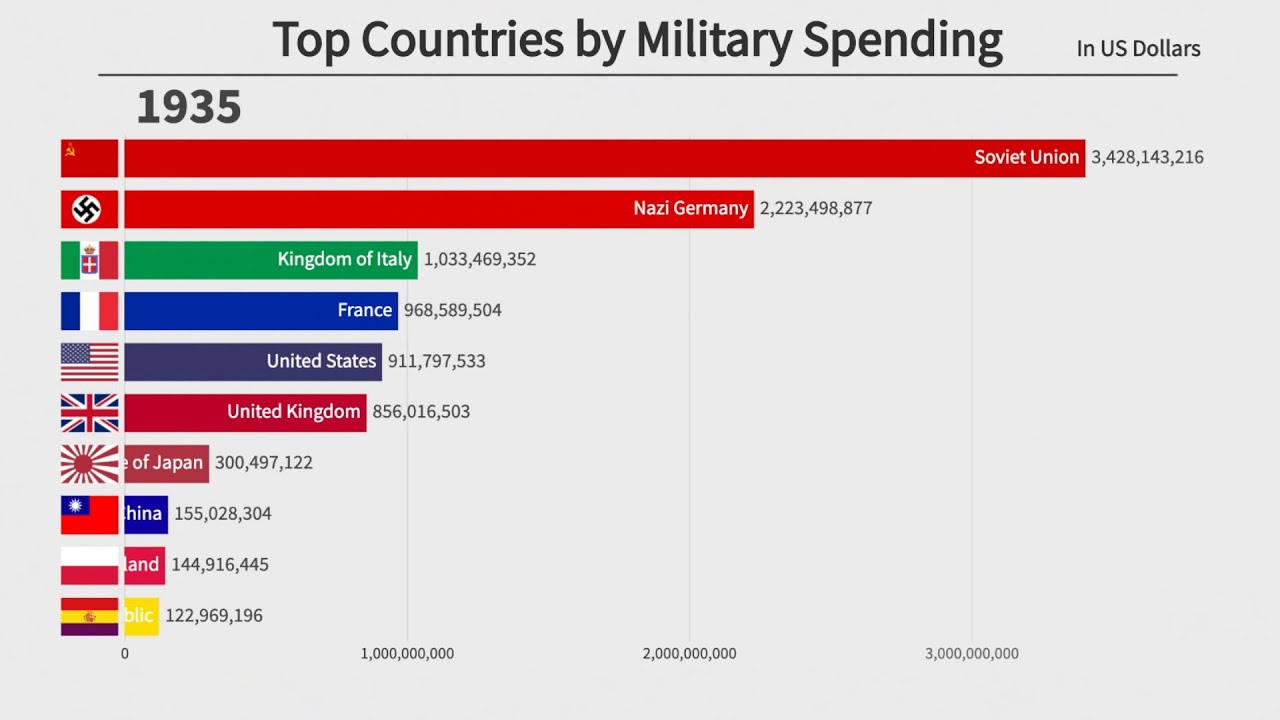Fascinating chart. But while it depicts military spending, it could realistically be labelled Top Ten Countries Supporting Empires. ONCE we were a nation of traders, but since the 30’s the corporate segment noted that it was easier to buy legislation than to actually compete. Slowly but inexorbably we have progressed to being an empire, with wide-spread “interests” - which we defend either directly or with military “extenders”, much as the old Roman Empire did.
Today the situation is crystal clear. We have given up our trading heritage by exporting our means of production while ever expanding our “sphere of influence” via military bases and “joint military exercises”. That’s what this chart really represents.
Fascinating! Several observations:
- I watched about a third of it before noticing the scale at the bottom changing. It would be even more interesting to see these changes on an absolute scale - though absent a log scale, it would be hard to display.
- The rate at which countries change their military spending is quite remarkable.
- I am surprised that Israel doesn’t appear in the most recent years. Can they have such a bargain basement military?
I found the ascent of Japan right before and during the 1905 war with Russia and vertiginous decline immediately after stunning. They don’t get back into the top ranks until 1920.
Since the charts show total expenditures, small countries don’t rank high even if their military spending is large per capita or as a fraction of GDP. Ranking military expenditures as a fraction of GDP, using the 2019 figures from the Stockholm International Peace Research Institute Military Expenditure Database, Israel is #5 in the world, with Russia at #11 and the U.S. #14. Israel’s military expenditures as fraction of GDP are more than 55% higher than those of the U.S. Also, Israel has universal military conscription, which probably reduces its personnel costs below that of an all-volunteer force which has to compete in the job market for recruits.
On the absolute scale of expenditures, Israel comes in at 14th in the world, between Canada and Brazil, with total expenditures 1/36 that of #1 U.S.
A real outlier in these data is Saudi Arabia, who ranks #6 by absolute expenditures and #2 by share of GDP, with a population only 3.6 times that of Israel.
Austria-Hungary really did not pull its own weight in WWI
Europe pre World War I.
Imagine if they built cars and roads instead of tanks and ships …
Failure of the elites – much like the globalists today.
Many cultures back then. Today individuals worldwide that understand freedom and prosperity really could be a force for peace God willing.
Austria-Hungary was really a fading empire around WWI. They picked a fight with Serbia thinking they could roll over “little” Serbia, only to find the Majar portion (Hungary) was not interested in a war with Serbia. They then leaned upon their age old bud - Germany - which made some serious miscalculations. And the war started.
I wonder what the numbers mean in physical terms? Some countries spend their military budgets on hypersonic gliders, others spend it on sex change operations and pensions.
The really striking thing over time is how useless the military spending has been over time for most of the spenders. France & the Russian Empire led the world in the 1870s – now one has gone, and the other one does not matter. What did the world-leading spending by the UK and the German Empire in the late 1800s get for them? High spenders like the Japanese Empire in 1904, the Soviet Union in 1922, Nazi Germany in 1937 – all gone.
Correlation might suggest that high military spending is analogous to a corporation building itself an impressive new HQ building – a sign of impending decline & disaster. But correlation is not causation. Maybe the real story is that only rich (or at least productive) countries can afford regimes pushing for world-leading military expenditures. But no regime stays unusually rich or unusually productive for more than a few decades.
